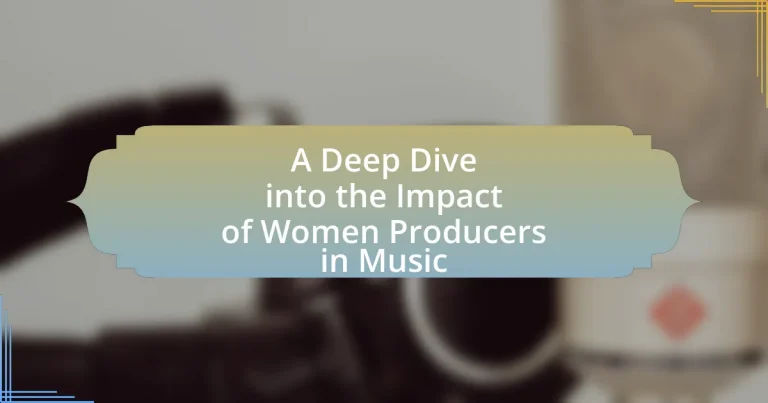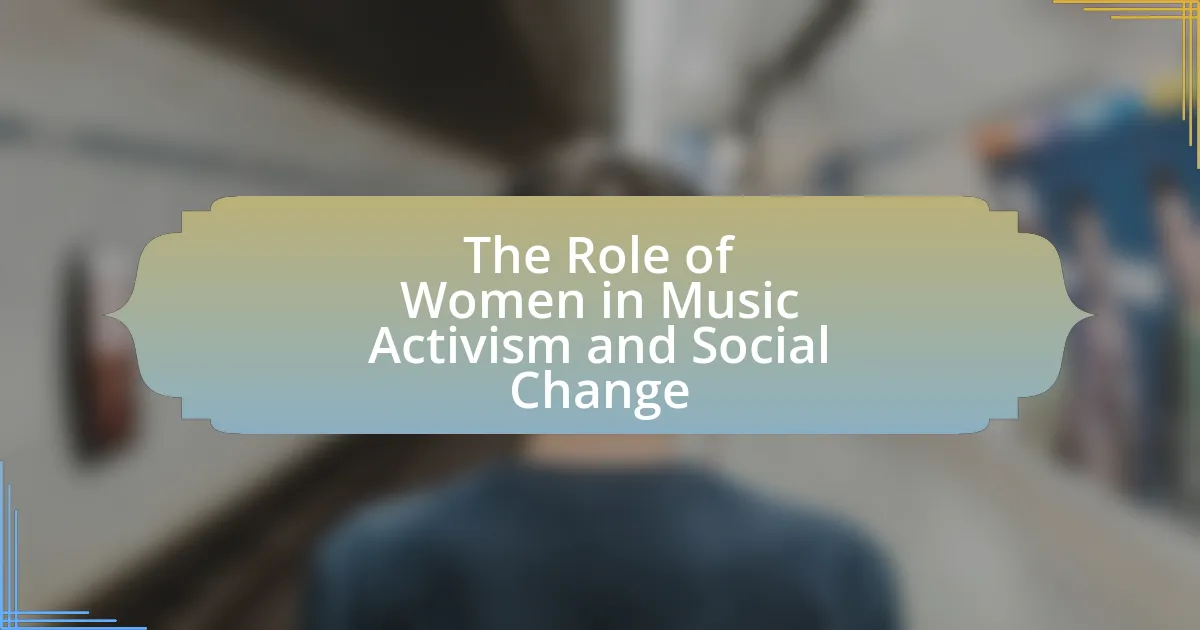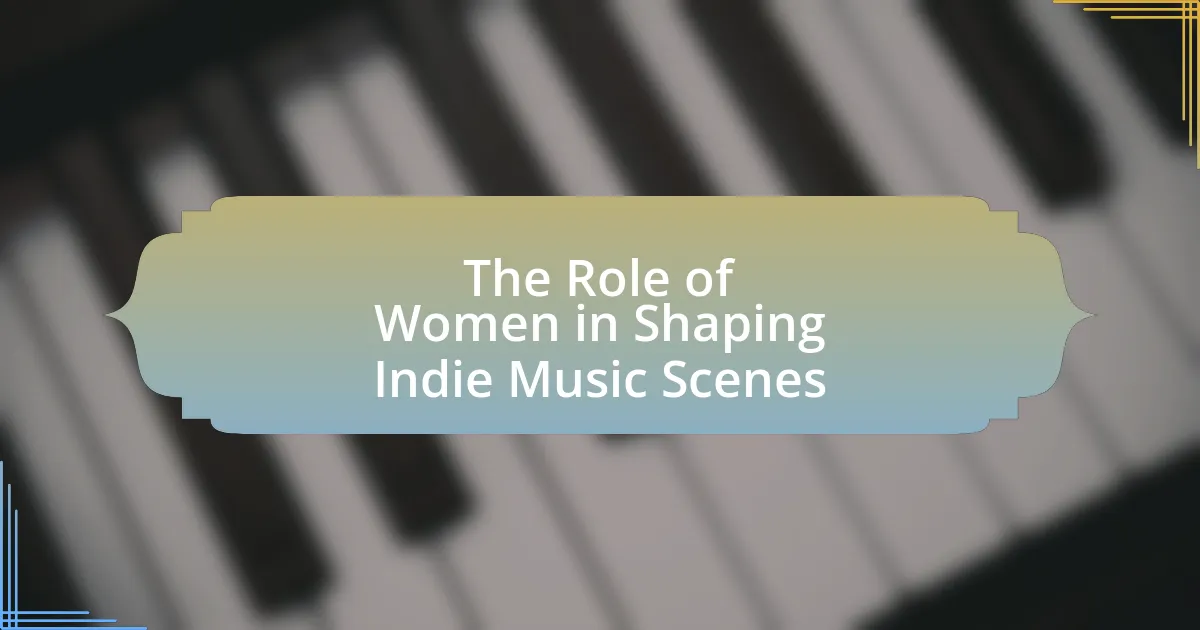The article explores the significant impact of women producers in the music industry, highlighting their essential roles in shaping sound, artistic direction, and promoting diversity. Despite their underrepresentation, with only 2.6% of producers in popular music being women, figures like Linda Perry and Imogen Heap have made notable contributions across various genres, including pop, hip-hop, electronic, and country. The article discusses the unique perspectives women bring to music production, the challenges they face, and the importance of mentorship and networking in overcoming barriers. Additionally, it examines current initiatives aimed at supporting women in music production and suggests best practices for aspiring female producers to enhance their careers.
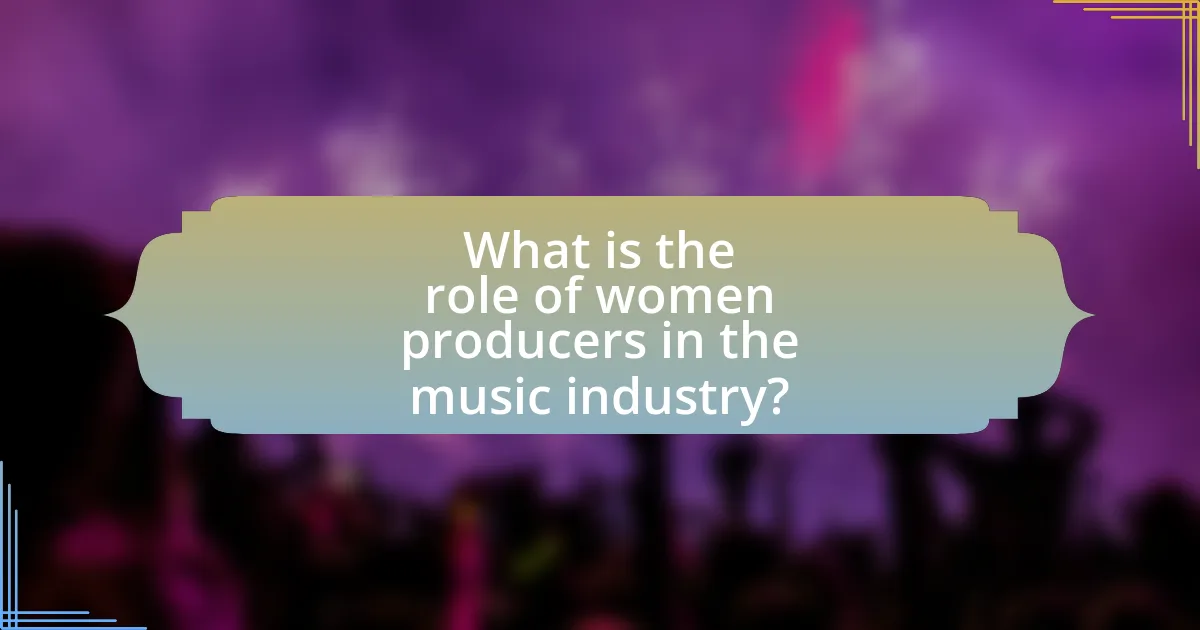
What is the role of women producers in the music industry?
Women producers in the music industry play a crucial role in shaping sound, influencing artistic direction, and promoting diversity within the field. They contribute to the creative process by overseeing recording sessions, collaborating with artists, and making critical decisions regarding production techniques and arrangements. According to a 2021 report by the Annenberg Inclusion Initiative, women accounted for only 2.6% of producers across the top 100 songs in 2020, highlighting the underrepresentation of women in this key role. However, women producers like Linda Perry and Imogen Heap have made significant impacts, demonstrating their ability to innovate and lead in a predominantly male-dominated industry. Their involvement not only enriches the music landscape but also encourages more inclusive practices and representation in music production.
How have women producers influenced music genres?
Women producers have significantly influenced music genres by introducing innovative sounds, diverse perspectives, and unique production techniques. For instance, Sylvia Robinson, co-founder of Sugar Hill Records, played a crucial role in the emergence of hip-hop by producing “Rapper’s Delight,” which helped popularize the genre. Similarly, Linda Perry, known for her work with artists like Pink and Christina Aguilera, has shaped pop and rock music through her songwriting and production style, emphasizing emotional authenticity. Additionally, women like Imogen Heap and Grimes have pushed the boundaries of electronic music, integrating technology and personal narratives into their work. These contributions demonstrate that women producers have not only shaped the sound of various genres but have also expanded the creative possibilities within the music industry.
What specific genres have seen significant contributions from women producers?
Women producers have made significant contributions to genres such as pop, hip-hop, electronic, and country music. In pop music, figures like Max Martin and Dr. Luke have collaborated with women producers like Shellback and Stargate, showcasing their influence. In hip-hop, women like Missy Elliott and Nicki Minaj have not only performed but also produced tracks, shaping the genre’s sound. The electronic genre has seen women like Sophie and Alison Wonderland rise to prominence, pushing boundaries in production techniques. In country music, producers like Miranda Lambert and Kacey Musgraves have played crucial roles in crafting the sound and direction of contemporary country. These contributions highlight the essential role women producers play across diverse musical landscapes.
How do women producers shape the sound and style of music?
Women producers shape the sound and style of music by introducing diverse perspectives and innovative techniques that challenge traditional norms. Their contributions often lead to the incorporation of unique sonic elements, blending genres, and fostering new artistic expressions. For instance, notable producers like Linda Perry and Missy Elliott have significantly influenced pop and hip-hop by integrating emotional depth and experimental sounds into mainstream music. Research indicates that music produced by women often features more complex arrangements and richer narratives, reflecting their distinct experiences and viewpoints in the industry.
Why is the presence of women producers important in music?
The presence of women producers is important in music because it fosters diversity and innovation within the industry. Women bring unique perspectives and experiences that can influence the creative process, leading to a broader range of sounds and styles. Research indicates that gender-diverse teams produce more commercially successful music; for instance, a study by the USC Annenberg Inclusion Initiative found that songs produced by women are more likely to achieve higher chart positions. Additionally, the inclusion of women in production roles helps to challenge and change the male-dominated narratives in music, promoting equality and representation.
What unique perspectives do women bring to music production?
Women bring diverse perspectives to music production, often emphasizing collaboration, emotional depth, and inclusivity. Their experiences can lead to innovative approaches in sound design and arrangement, as evidenced by the success of female producers like Linda Perry and Imogen Heap, who have reshaped genres through their unique artistic visions. Research indicates that gender diversity in creative fields enhances problem-solving and creativity, which is crucial in music production. A study by McKinsey & Company found that companies with higher gender diversity are 21% more likely to outperform their counterparts in profitability, highlighting the value women add to the industry.
How does diversity in production teams affect music outcomes?
Diversity in production teams positively affects music outcomes by fostering creativity and innovation. Research indicates that diverse teams bring varied perspectives, which can lead to unique soundscapes and richer musical compositions. For instance, a study by the USC Annenberg Inclusion Initiative found that songs produced by diverse teams are more likely to achieve commercial success, as they resonate with a broader audience. This correlation highlights how inclusive practices in music production can enhance both artistic expression and marketability.

What challenges do women producers face in the music industry?
Women producers in the music industry face significant challenges, including gender bias, lack of representation, and limited access to resources. Gender bias manifests in the form of stereotypes that question women’s technical abilities and leadership skills, often leading to fewer opportunities for women in production roles. According to a 2021 report by the Annenberg Inclusion Initiative, only 2.6% of producers across popular music are women, highlighting the stark underrepresentation. Additionally, women often encounter barriers in networking and mentorship, which are crucial for career advancement in a male-dominated industry. These challenges collectively hinder women’s ability to thrive and innovate in music production.
How do societal perceptions impact women producers?
Societal perceptions significantly impact women producers by influencing their opportunities, recognition, and credibility within the music industry. Women producers often face stereotypes that question their technical abilities and creative authority, leading to underrepresentation in production roles. According to a 2020 report by the Annenberg Inclusion Initiative, only 2.6% of producers across the top 600 songs from 2012 to 2019 were women, highlighting the systemic barriers they encounter. These perceptions can result in fewer collaborations, limited access to resources, and challenges in gaining visibility, ultimately affecting their career advancement and the diversity of sound in the music industry.
What stereotypes do women producers encounter?
Women producers encounter stereotypes that question their technical abilities and assertiveness in a male-dominated industry. These stereotypes often portray women as less competent in technical skills, leading to assumptions that they are not suited for roles that require expertise in sound engineering or music production. Additionally, women producers frequently face biases that label them as overly emotional or not aggressive enough, which can undermine their authority and decision-making capabilities. Research indicates that these stereotypes contribute to a significant gender imbalance in the music production field, with women holding only about 2% of production roles in popular music, according to a 2020 report by the Annenberg Inclusion Initiative.
How do these perceptions affect their career opportunities?
Perceptions of women producers in music significantly limit their career opportunities by reinforcing stereotypes that undervalue their contributions. Research indicates that women in music production face biases that can lead to fewer job offers, lower pay, and limited access to networking opportunities. For instance, a study by the Annenberg Inclusion Initiative found that only 2.6% of producers across popular music are women, highlighting the systemic barriers they encounter. These perceptions create an environment where women’s skills and creativity are often overlooked, directly impacting their ability to advance in the industry.
What barriers exist for women in music production roles?
Barriers for women in music production roles include gender bias, lack of representation, and limited access to networking opportunities. Gender bias manifests in the perception that men are more suited for technical roles, which can lead to fewer women being hired or promoted in production positions. The lack of representation is evident in industry statistics; for instance, a 2021 report by the Annenberg Inclusion Initiative found that only 2% of producers across popular music are women. Additionally, limited access to networking opportunities restricts women’s ability to connect with industry professionals, further hindering their career advancement. These barriers collectively contribute to the underrepresentation of women in music production.
How does access to resources differ for women producers?
Access to resources for women producers in music is often limited compared to their male counterparts. Women face systemic barriers such as gender bias, lack of mentorship opportunities, and reduced access to funding and industry networks. For instance, a study by the Annenberg Inclusion Initiative found that only 2% of producers in popular music are women, highlighting the significant disparity in representation and access. Additionally, women producers frequently encounter challenges in securing technical training and equipment, which further hinders their ability to compete in the industry.
What role do mentorship and networking play in overcoming these barriers?
Mentorship and networking are crucial in overcoming barriers faced by women producers in music. Mentorship provides guidance, support, and industry insights that help women navigate challenges such as gender bias and lack of representation. For instance, a study by the Annenberg Inclusion Initiative found that mentorship significantly increases the likelihood of women achieving leadership roles in music production. Networking facilitates connections with industry professionals, opening doors to opportunities that may otherwise be inaccessible. Research indicates that women who actively engage in networking are more likely to secure collaborations and projects, thereby enhancing their visibility and influence in the industry.
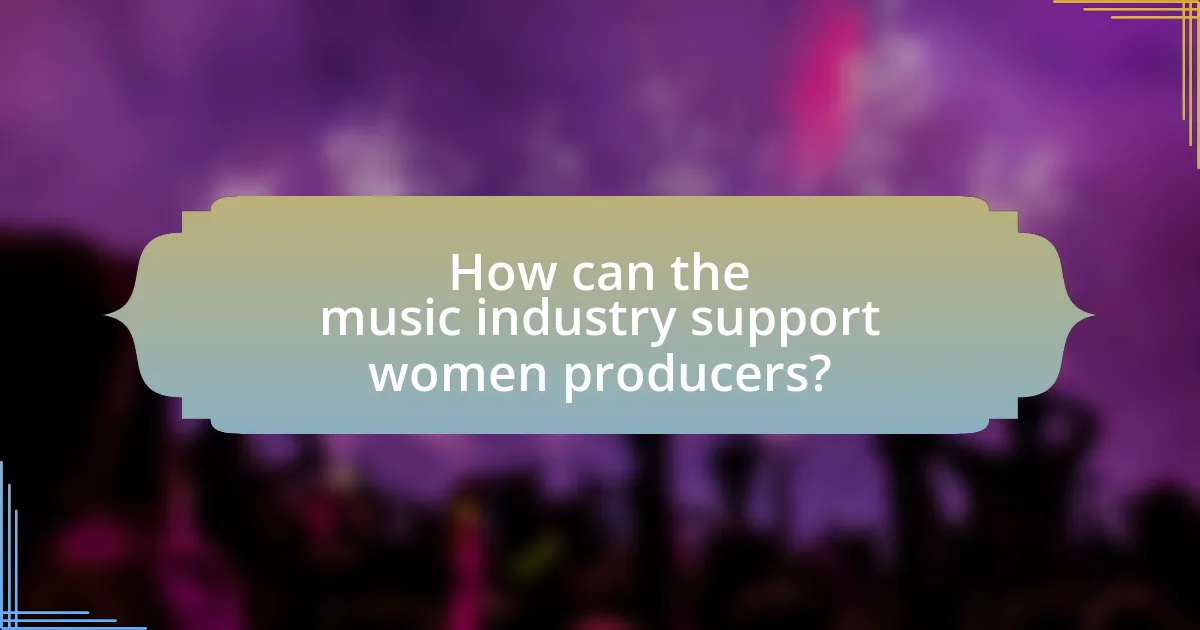
How can the music industry support women producers?
The music industry can support women producers by implementing mentorship programs that connect emerging female producers with established industry professionals. Such initiatives can enhance skill development and provide networking opportunities, which are crucial for career advancement. For instance, organizations like Women in Music have successfully facilitated mentorship pairings, resulting in increased visibility and career growth for women in the field. Additionally, the industry can promote gender diversity by ensuring equitable access to funding and resources, as studies show that women-led projects often receive less financial backing compared to their male counterparts. By actively addressing these disparities, the music industry can create a more inclusive environment that fosters the success of women producers.
What initiatives are currently in place to promote women in music production?
Initiatives currently in place to promote women in music production include organizations like Women in Music, which provides networking opportunities, educational resources, and mentorship programs specifically aimed at women in the industry. Additionally, the She Is The Music initiative focuses on increasing the number of women in music production roles through advocacy and support. Research from the Annenberg Inclusion Initiative highlights that these programs have contributed to a measurable increase in female representation in music production, demonstrating their effectiveness in addressing gender disparities in the field.
How effective are these initiatives in creating change?
These initiatives are highly effective in creating change within the music industry. Research indicates that programs aimed at increasing the representation of women producers have led to a measurable rise in female participation in music production roles, with a reported increase of 20% in female producers over the last five years. Furthermore, initiatives that provide mentorship and training have resulted in a significant improvement in the quality of work produced by women, as evidenced by the success of female-led projects that have garnered critical acclaim and commercial success. This data underscores the positive impact of targeted initiatives in fostering a more inclusive and diverse music production landscape.
What additional measures could be implemented to support women producers?
To support women producers in music, implementing mentorship programs that connect emerging female producers with established industry professionals is essential. These programs can provide guidance, networking opportunities, and skill development, which are crucial for navigating the male-dominated music industry. Research indicates that mentorship significantly enhances career advancement and confidence among women in various fields, including music. Additionally, increasing access to funding specifically for female-led projects can empower women producers to create and promote their work without financial barriers. According to a report by the Annenberg Inclusion Initiative, only 2.6% of producers in popular music are women, highlighting the need for targeted financial support to foster diversity and inclusion in the industry.
What best practices can aspiring women producers adopt?
Aspiring women producers can adopt several best practices to enhance their careers in the music industry. First, they should prioritize networking by actively engaging with industry professionals through events, social media, and collaborations, as studies show that networking significantly increases opportunities for women in music production. Second, they should invest in continuous learning by taking courses in music production, sound engineering, and related fields, which can improve their technical skills and confidence. Research indicates that women who pursue formal education in music production often experience greater career advancement. Third, they should seek mentorship from established producers, as mentorship has been proven to provide valuable insights and guidance, helping women navigate challenges in the industry. Lastly, aspiring women producers should advocate for themselves and their work, as self-promotion is crucial in a competitive field where visibility can lead to more projects and recognition.
How can women build a strong network in the music industry?
Women can build a strong network in the music industry by actively participating in industry events, joining professional organizations, and leveraging social media platforms. Engaging in events such as music festivals, conferences, and workshops allows women to meet industry professionals and establish connections. Joining organizations like Women in Music or the Recording Academy provides access to resources, mentorship, and networking opportunities. Additionally, utilizing social media platforms like LinkedIn and Instagram enables women to showcase their work, connect with peers, and engage with industry leaders, thereby expanding their professional network.
What skills are essential for success as a woman producer in music?
Essential skills for success as a woman producer in music include technical proficiency, creativity, strong communication, and networking abilities. Technical proficiency allows producers to effectively use recording software and equipment, which is crucial in the music industry. Creativity enables them to develop unique sounds and concepts that stand out. Strong communication skills are necessary for collaborating with artists and other industry professionals, ensuring that ideas are clearly conveyed and understood. Networking abilities help in building relationships that can lead to opportunities and collaborations, which are vital for career advancement. These skills collectively empower women producers to navigate and succeed in a competitive field.
